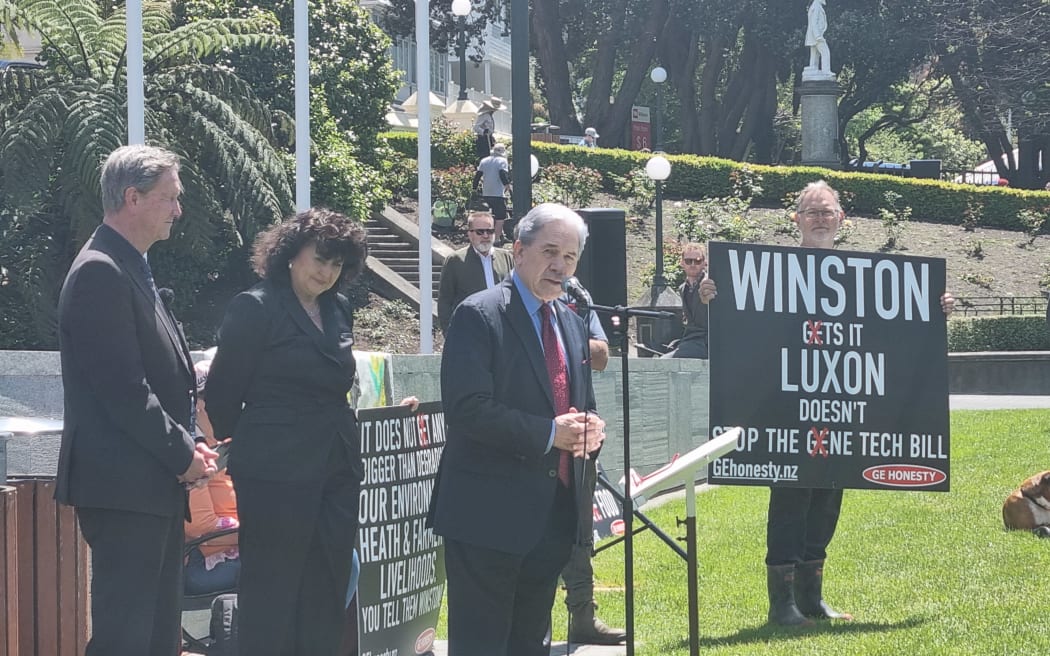Copyright farmersweekly

Reading Time: 4 minutes By Giles Dexter of RNZ New Zealand First leader Winston Peters has sought to reassure a crowd opposing the Gene Technology Bill that his party will not support the bill if it cannot be “fixed.” But he stopped short of a commitment to kill the bill outright, saying he would not give an “absolutist” answer. Around 400 people gathered on Parliament’s lawn for a “picnic”, urging the government to drop the bill. The bill would relax New Zealand’s gene technology restrictions, ending a 30-year ban on gene technology outside laboratory settings. New Zealand First has previously said it would withhold support for the bill, unless there are major changes to improve protection for humans and the environment. Arriving to applause and chants of “stop the bill,” Peters said the bill could dramatically change New Zealand, and his party would not vote for it unless certain conditions were met. After one person shouted that there was no fixing the bill, Peters referred to the coalition agreement. “We don’t go in for absolutism. What we’ve said is this bill’s going nowhere unless we’re satisfied and we’re confident that it doesn’t represent any danger,” he said. “Let me tell you, if the bill can’t be fixed up, it won’t be going ahead.” Green MP Scott Willis told the crowd their numbers were a sign the government did not have New Zealanders’ support. Willis said government was “selling out” to chemical companies, and the bill was “an insult to who we are as Kiwis” and a “middle finger” to family farms. GE Free spokesperson Jon Carapiet said the government had failed to take farmers and exporters with them, and ignored submissions that had told it to slow down and consult further. Carapiet described the select committee process as a “sham,” and urged New Zealand First to cross the floor and stop the bill. “It was written for industry, by industry. The select committee basically gave into industry consultants. They have not listened to the public, they have not listened to exporters. And I think it’s a very serious threat to our economy, as well as the environment and people’s health.” Science Minister Dr Shane Reti said he was “encouraged” by the Select Committee’s report, including recommendations for a four-year review of the legislation, and mandatory registration for exempt organisms. “I’m encouraged, because I think that everyone understands that if we want modern health technology we are going to need to step into this space. I think everyone understands that overseas farmers who have the ability to do what we can’t, they are producing faster, better, and with less herbicides,” he said. “They will eat our lunch. So, I think people understand this, it’s just how we safely do that, how we convey the safety guards and safety rails that people need, that’s the step we’re at now.” Some of the bigger changes proposed by the committee, and supported by all parties, include: Have the Regulator be an Environmental Protection Authority employee, appointed by the Minister on the EPA’s recommendation following a recruitment process Make the Regulator accountable to the EPA rather than the minister, for independence Clarify organisms that will not be regulated, and enable regulations to declare whether things are considered organisms or not; whether they are regulated or not; and whether specific technologies are or are not “gene technologies” Specify the regulator would be appointed for up to five years, with an option to be reappointed Add specified grounds for removal of the regulator and the ability to appoint an acting regulator Set parameters for the minister’s ability to direct the regulator, and specifying that the minister cannot intervene in individual decisions by the regulator Add a requirement for annual reporting, in line with Australia’s similar law Add a requirement for the minister to review how well the law is working, starting within four years of it taking effect Require the minister to consult the regulator, people affected by proposed regulations, and the wider public – rather than just one of these groups Expand the definition of kaitiaki relationships Require the Māori advisory committee to advise the regulator on applications for using GMO tech on “non-indigneous species of significance” as well as indigenous species Provide a definition of “non-indigneous species of significance” and allowing the minister to add species to this list Align the appointment criteria and membership requirements for the Māori advisory committee with the Māori Plant Varieties Committee from the Plant Variety Rights Act 2022 Give inspectors powers to require a statutory declaration from people importing regulated GMOs, and have further powers to gather personal information, and other powers.



